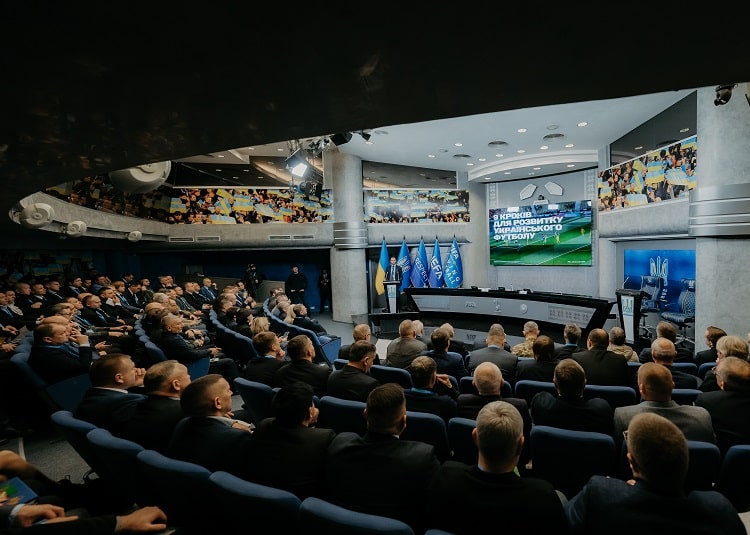Congress
UAF Congress

(From UAF Statute)
UAF Statute)
Article 16. Congress. General Powers, Decision-Making Powers
- The highest governing body of the UAF is the Congress.
- The procedure for conducting the Congress and other meetings/sessions of the UAF management bodies is determined by the Procedural Regulations of the UAF, approved by the Congress.
Article 17. Amendments to the Statute and Procedural Regulations
- The Congress makes decisions regarding amendments to the Statute and Procedural Regulations.
- Any proposals for amending the Statute shall be submitted by a member of the UAF or the Executive Committee to the Administration no later than thirty days before the established date of the Congress in writing with a brief explanation of their content. A proposal by a UAF member becomes effective if it is supported in writing by at least three other UAF members.
- A proposal to amend the Statute is adopted if it receives at least 3/4 of the votes of the Congress delegates present at the Congress meeting.
- Any proposal to amend the Procedural Regulations shall be submitted by a UAF member or the Executive Committee to the UAF Administration no later than thirty days before the established date of the Congress in writing with a brief explanation of their content.
- A proposal to amend the Procedural Regulations is adopted if it receives more than half of the votes of the Congress delegates present at the Congress meeting.
Article 18. Regular Congress. Powers, Notification, Agenda
- The regular Congress is held annually, usually before the UEFA and FIFA Congresses, if such are held.
- The matters within the competence of the regular Congress include:
2.2 election of persons to count votes (Counting Commission);
2.3 election of the Congress secretary and three delegates to conduct and verify the Congress protocol;
2.4 consideration and approval of the report of the President, Executive Committee, and Administration;
2.5 consideration and approval of the conclusion of the Audit Body, annual financial report;
2.6 election and termination of the President's powers of the UAF;
2.7 election, termination, and temporary suspension of the powers of the first vice-presidents and vice-presidents of the UAF;
2.8 election, termination, and temporary suspension of the powers of the members of the Executive Committee;
2.9 election, termination, and temporary suspension of the powers of the chairperson, vice-chairperson, and members of the Control and Disciplinary and Appeals Committees;
2.10 election, termination, and temporary suspension of the powers of the Audit Body;
2.11 amendments to the Statute and Procedural Regulations;
2.12 decisions on the reorganization or liquidation of the UAF;
2.13 consideration of proposals and decision-making thereon;
2.14 consideration of applications and decisions on membership admission, decisions on cancellation or extension of temporary suspension of membership, or exclusion of members from the UAF;
2.15 decisions on the election, termination, and temporary suspension of the powers of a member of the Executive Committee or a member of another UAF body;
2.16 granting the status of Honorary President and Honorary Member;
2.17 realization of property rights of the UAF and delegation of such functions to other UAF management bodies, legal entities, separate subdivisions, or other legal entities established by the UAF;
2.18 other powers specified by legislation, the Statute, and documents of FIFA and UEFA.
- Notification of the regular Congress is sent by the UAF Administration to UAF members written at least three months before the date of its convocation. An official invitation to the Congress is sent no later than two weeks before the date of the scheduled meeting, along with the proposed agenda, prepared by the Executive Committee.
- A UAF member wishing to include an item on the agenda of the Regular Congress must submit proposals in writing to the Administration at least forty-five days before the Congress convenes. Such a proposal must be formulated and include the reasons for its submission.
- No later than four weeks before the date of the regular Congress, UAF members send to the UAF Administration an excerpt or minutes of the meeting of the respective management body on the election of delegates by the established statutory norms of representation at the Congress and nominated candidates for the election of the President of the UAF, other elective positions in the UAF bodies, if any. Football referees of any level, representatives of any football judiciary bodies, the chairman, vice-chairman, and members of the UAF Dispute Resolution Chamber cannot be elected as Congress delegates.
- Each permanent member of the UAF has the right to be represented at the Congress by three delegates, and an associate member of the UAF - by one delegate.
- The Congress meeting has a quorum if at least 2/3 of the total number of elected delegates are present at it.
- The agenda of the Congress may be amended by the Congress itself, as the highest governing body of the UAF, if such a proposal receives at least 3/4 of the votes of the attending Congress delegates.
- A decision to terminate the activities of the UAF (self-dissolution or reorganization) is made by Congress if such a proposal receives at least 3/4 of the votes from the total number of elected delegates of the UAF Congress.
Article 19. Extraordinary Congress. Powers, Notification, Agenda
- The Executive Committee, upon a proposal supported by at least 3/4 of the total number of UAF members, may convene an extraordinary Congress at any time.
- The Executive Committee is obliged to convene an extraordinary Congress if at least 3/4 of the total number of UAF members, through their governing bodies, have provided written decisions (protocols or extracts from them) with the specified proposal. If such a demand from UAF members for convening an extraordinary Congress is not met, these members have the right to convene an extraordinary Congress themselves.
- The proposal for holding an extraordinary Congress must necessarily contain the agenda of the Congress.
- The extraordinary Congress must be held no later than sixty days from the date of receipt by the UAF Administration of properly formalized proposals specified in paragraphs 2 and 3 of this article.
- The agenda of the Extraordinary Congress is approved by the Executive Committee no later than ten days from the date of receipt of the proposal for convening the Extraordinary Congress. The Executive Committee may include in the agenda items that fall within the competence of the regular Congress.
- The Administration sends written notification of the convening of the extraordinary Congress to UAF members no later than fifty days before the established date of its holding.
- UAF members inform the Administration of the date, time, and place of the meeting of their highest governing body for the election of delegates to the extraordinary Congress no later than forty-five days before the established date of its holding.
- UAF members provide the Administration with an excerpt or minutes of the meeting of the relevant governing body on the election of delegates to the extraordinary Congress and their data, no later than thirty days before the established date of the Congress. Football referees of any level, representatives of any football judiciary bodies, the chairman, vice-chairman, and members of the UAF Dispute Resolution Chamber cannot be elected as delegates to the extraordinary Congress.
- The Administration must send the agenda of the extraordinary Congress and an official invitation to the Congress to UAF members at least fourteen days before the established date of its holding.
- If the extraordinary Congress is not convened by the Executive Committee within the deadlines specified in paragraph 4 of this article, UAF members who demanded its convening may seek legal assistance from UEFA and FIFA.
- The extraordinary Congress has the right to consider any matters within the competence of the Regular Congress. The agenda of the extraordinary Congress may be amended if such a proposal receives at least 3/4 of the votes of the delegates present at the extraordinary Congress meeting.
